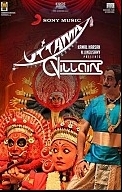PHOTOS & STILLS - GALLERY
VISITOR COLUMN

Article on Uttama Villain Screenplay (observations)
By A.S.SriramanBehindwoods.com isn't responsible for the views expressed by the visitor in this column. The visitor claims that this column is his/her own. If the column infringes any copyrights that you hold, please email us at columns@behindwoods.com.
HUGE SPOILERS!!
When I saw the shot of the universe (the last shot of the movie), I was dumbfounded and as I came out of the theatre I was asking myself whether any screen writer from India had ever written such a nuanced, multi layered, reference filled screenplay and to my surprise I heard lot of people saying there is not much in the movie except Kamal’s performance and the movie within the movie, the fictional eighth century folklore portions being of no relevance/no purpose to the movie. The following are some of my observations of the meta - screenplay of Uttama Villain.
The film begins with Manoranjan (star actor) attending the premiere of his new movie which even his own son claims to be clichéd masala run of the mill movie. The audience are seen cheering for their hero whose name appears on screen. Manoranjan was introduced by Margadarsi (KB) with whom he churned out classic movies. Manoranjan also learns through Jacob (Jeyaram) that he has a daughter outside of marriage through late Yamini with whom he was passionately in love with.
Manoranjan then learns that he has not much time left and starts to worry about his legacy. Hence he approaches KB to direct his last film leading to the folklore portions having a contrasting tone to the present day happenings. The screenplay then inter cuts between the two contrasting portions which are part of the same story seamlessly and brilliantly and the relevance of that portion of the movie holds the key to unlock the mind of Manoranjan. The film (movie within the movie) poetically features a protagonist (Uttaman) who is believed to have cheated death and is believed to possess sagavaram. Uttaman comes to get such a name while cheating death several times and the movie cuts to present day when Manoranjan meets his daughter (Parvathy Menon) for the first time where he suffers from a near death experience. And when Parvathy Menon enters his room, the historical background is being moved out so as to give way to reality. She also suggests that he is a villain to her and she wouldn’t want to call him her father.
The movie then introduces the evil mad king played by Nasser who by his trickery became the King of the fictional Muthuvala Naadu and the movie also introduces the princess (Pooja Kumar) who the king tries to control and consume. The Princess writes to the King of the next kingdom for help which never reaches him (It is later revealed in the movie that Yamini wrote a letter to Manoranjan which never reached him). After hearing the astrologer’s prediction of his impending death, the King starts to worry (Manoranjan faces death) and comes to hear of Uttaman’s exploits and summons him. Uttaman who is an artist is brought in chains before him. Uttaman is again tested as to his powers and has again managed to come out unscathed with the help of the spy who appears later in the film indicating the real identity of Uttaman. While cutting back to reality, Manoranjan is seen bleeding at intermission watching a freshly caught fish from the water (which will eventually die).
Uttaman (Manoranjan) then confronts his fear about facing death which is portrayed in the form of a tiger and when agreeing to do his duties by the Kingdom, Uttaman manages to tame the tiger and when the scene cuts back to Manoranjan having a confrontation with his manager (MS Bhaskar), he exclaims whether MS Bhaskar knows the real meaning of passing with a sense of realization. Another example of brilliant screen writing is when the letter written by Yamini which comes to light after many years, MS Bhaskar who hid it all along moves towards the light to read it out and Manoranjan moves towards the “Villain” projected on screen with the little red light flashing at his nose (The letter which never reached him and which made him a villain). Since Manoranjan has come to terms with facing his destiny i.e. death (portrayed in the form of tiger), he then conveys the same to his family.
Uttaman then sings to the King who is obsessed with immortality that the said quality is over-rated and advises him to do by his duties and sow a seed of new life which concept of (Nilayaamai) seems to fly past the head of the king after which the allies decide to plot together to get rid of the evil king. The princess then tells Uttaman that he is not really scared but courageous after which the spy who appears also hints that there is more to Uttaman than what meets the eye while hinting at a love interest between Uttaman and the princess in exile and the screenplay then cuts to Manoranjan facing up with the doctor (Andrea) with whom he shares a complex relationship after meeting his wife in hospital.
Uttaman then tells the king as to the ways in which one can become immortal and one among them is to become an immortal artist. Therefore they decide to stage a play on the life of Hiranyakashipu who is not capable of being killed by any man or beast (Immortal) and who is perturbed by his son Prahlad worshipping lord Vishnu (Manoranjan and his Manonmani). The king wants to take the easy route to get applause since he is not able to spell out the lengthy dialogues properly.
Manoranjan after setting things right with his family, then proceeds to his final play (convinced about wanting to be immortalized on screen). The screenplay touches its peak where Manoranjan removes his theyyam make up, while making his daughter read the letter Manoranjan wrote to her mother years before willing to let go of everything for the love of his life revealing his true face and leading to his reconciliation with his daughter. The scene also makes a reference to Terrence Malick “The Tree of Life”. As Manoranjan watches his family with a sense of satisfaction “Yen Udhirathin Vidhai, Yen Uyir Udhirtha Sadhai” begins (Manoranjan – Manonmani – Jacob). After finishing the song, Manoranjan while taking the fall witnesses death coming near him and pleads with the director to do the song again since he mis-spelled certain words.
As and when the drama happens in the movie within the movie, the evil king (who couldn’t pronounce all the dialogues properly) is killed. When cutting back, it is also revealed Manoranjan has also passed away. Uttaman the artist who is also the king of a different Kingdom (to whom the message somehow reached) are shown to have defeated the evil. When the film ends, the immortal artist is revealed to be the mritunjayan at the theatre.
“Saagavaram pol soogam undo, theera kadaiyai ketpaar undo.
Maalaathathu kalaiyum Kaviyum
Maayathathendrum nam arivum anbum”.
The eighth century folklore portion being the meta reference to what went on in the mind of Manoranjan when he was faced with such a situation as in the movie. The actor contemplating life, death, love & his legacy. The actor dealing with both the good and the evil side of him (Uttama Villain). Nasser representing the villain in the artist, Uttaman as the name suggests representing the good side of artist and tiger representing the death which is closing in. The villainous side of Manoranjan is killed/defeated (Nasser) and the immortal artist (Uttaman) lives on.
The movie adaptation of Life of Pi featured such references/layered characters and was hailed as brilliant unanimously. The movie Birdman which was adjudged the best movie of the year 2014 dealt with a washed up actor trying to become relevant while contemplating life among many other things. The Meta references/screenplay in that movie by Alejandro Inarritu was hailed as a modern masterpiece. The screenplay in Uttama villain is certainly one of the best layered/meta - screen writing to ever grace the cinema halls in India. Will this masterful screenplay by a film maker from Alwarpet be recognized?
sriramanadvocate@gmail.com
Please send your column to columns@behindwoods.com.










